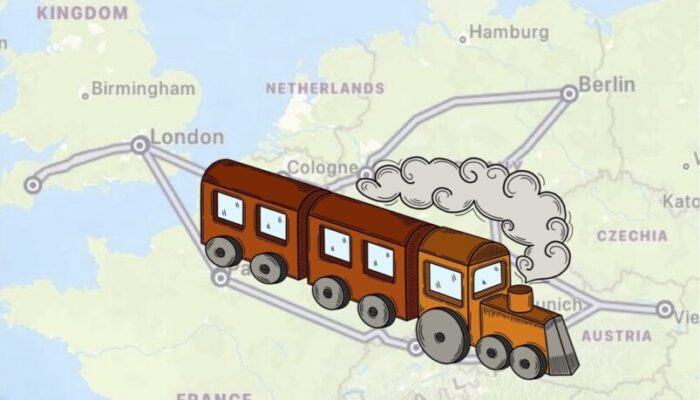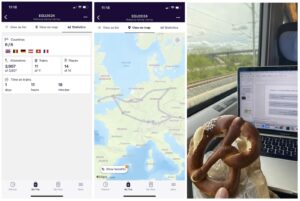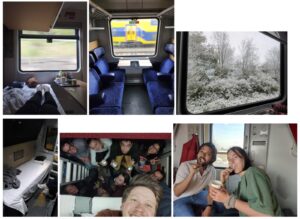
We encourage you to travel to EGU by train! Here are 4 train journey stories from the UK, the Netherlands, Sweden and France to inspire your trip.
From the UK with Interrail (by Becky Varney) 🇬🇧
What was your motivation to take the train?
As travelling to a primarily climate focused conference, I wanted to try and reduce my carbon footprint as best I could. I also think trains are a really nice way to travel and I always enjoy travelling this way. As someone who gets quite travel sick, trains for me are much better than flying, and getting to see more of Europe is an exciting bonus!
What was your general impression?
I travelled to EGU by train in both 2023 and 2024 and have to say I have been very lucky! In total this involved taking 22 trains across multiple countries and I had zero problems – no train delays, no cancellations, everything always went smoothly. I am aware that when travelling this is not always the case, as with travelling by planes, sometimes delays are unavoidable (fingers crossed for 2025!), but my impression was very positive, and I enjoy passing through so many countries as I go.
How long was your trip door-to-door?
In total for EGU 2024, I spent 35 hours and 18 minutes on trains travelling there and back. However, you have lots of flexibility for route options between London and Vienna so it can vary. If travelling during the day, the UK to Vienna is between 1 and 2 days of travelling depending on how much you are willing to push into a day (and how far you are from London). I decided to do some personal travel which broke up the journey, staying with my sister in Berlin on the way there, and booking a couple of nights in the Austrian alps on the way back. If you’re not in a position to stay somewhere overnight, or want to be more efficient with time away from home, another option would be to take the nightjet so you travel by train overnight (which you can take from either Paris or Brussels).
How much did it cost?
Approximately 368 € (+ overnight accommodation x 2).
Interrail passes are bought by the number of travel days, and on each of these days you can travel for as far / on as many trains as you like. The 4 day pass costs 283 € (or 212 € if you’re lucky enough to be younger than 28 years old!), which is enough to get from the UK to Vienna and back. For some trains, it is required to reserve seats with your interrail pass and there is an additional booking fee for doing so. The main one is the Eurostar which costs about 30 € each way, and if you’re travelling through France, then reservations are also required for all French trains and the price depends on the train (Zurich to Paris was 28 €).
What are your tips for EGU train travellers?
- I am a big fan of Interrail passes! If you’re travelling from the UK often the biggest expense is the Eurostar (which is not really avoidable unless you want to get a ferry…), but with an Interrail pass the price is much more reasonable. An Interrail pass also gives you so much more flexibility if you run into train issues, as you can pretty much get on any train and go anywhere! The Interrail app is also useful in helping you choose your route.
- Book Eurostar as soon as you can! There are a limited number of tickets allocated to Interrail passes per Eurostar train, so it is best to reserve these seats as early as you can so you can get the train you want. When in mainland Europe, whether that’s Paris or Brussels, you have more flexibility on the route to Vienna. However, as you have to use the Euro tunnel to leave the UK by train, not being able to book the specific Eurostar you want can limit your travel options quite significantly. The earlier this is booked the more flexibility you will have.
- It is a long journey, so travelling with other people if you can is always more fun. I travelled mostly with colleagues and we made use of the time by practising our EGU presentations, but also relaxing and playing card games.
- The way back takes less time! As the UK is an hour behind the central European time zone, when you travel back to the UK you gain an hour travelling to London, so you can fit more travel within 1 day compared to on the way there.
From the Netherlands with a night train and friends (by Jacoline van Es) 🇳🇱
What was your motivation to take the train?
I had some appointments on the Sunday before and taking the night train was simply the best way to arrive in Vienna in the early morning.
What was your general impression?
I took the Nightjet and booked a sleeper Cabin. This means that you get a room with 3 people where you share a bunk bed and a bathroom with a toilet and a shower. In the morning you store your bed away and have a nice seat with a filling breakfast.
How long was your trip door-to-door?
In total it took me 14 hours, which is partly because the train halts during the night so you don’t arrive at 6 in the morning. I only had one transfer from my hometown to the Netherlands. It took me 13 hours in total (20.00 departure, arrive at 9.17 in Vienna). I did not mind this, since I was sleeping anyway. I did miss the first session because of this.
How much did it cost?
329,90 € (one way)
What are your tips for EGU train travellers?
- Use seat61.com to plan your journey.
- Take a night train if possible, I think the night train is a great option. It allows you to travel while sleeping and still obtain a good night’s sleep. Not everyone sleeps well in these trains, so I would advise to take the train a day before. You also don’t have to stress about missing connections.
- Book together with people you know. Bring some beers & a board game and have fun in the evening.
- If you travel by a seated car, you won’t get anything like a blanket. It is best to bring a sleeping bag to feel nice and comfortable. Book together with a friend in the opposite seat, so you can lay your feet on each other’s seats.
- In Sleepers and couchettes, your breakfast will arrive approximately an hour before arrival.
- Get the OBB app to see any delays on your train (to know if you can stay in bed longer).
From Sweden with a detour to visit family (by Alex Hamm) 🇸🇪
What was your motivation to take the train?
The climate research school (CRS) within the Bolin Centre, which is a centre for climate research that Stockholm University is part of, offers full coverage of travel costs for conferences when we take the train. Otherwise, they cover a maximum of 500 € for such trips. Therefore, a group of PhD students from my department, as well as one from another department, decided to take the train to reduce our carbon footprint, and to see how it is to travel that far by train to go to a conference.
What was your general impression?
Generally, I really like trains and prefer them over planes. However, travelling on a night train can be a very different experience for different people. As someone who doesn’t have an easy time falling asleep anywhere easily, it meant a lot of sleep deprivation and low energy the following days until I recovered. Otherwise, the Swedish night train was pretty comfortable (Snälltåget), but the 6-bed compartments in the old Öbb trains were extremely uncomfortable.
How long was your trip door-to-door?
We took 2 night trains, spending about 24 hours on trains and another 9 hours in Berlin during the day.
How much did it cost?
Night trains are expensive, especially if you want a comfortable bed or private space. We decided to go with the cheapest option but most privacy. One way (Stockholm to Berlin to Vienna) cost about 250 €. On the way back, I passed by my family’s place in Germany and paid another 230 € on trains to get back to Stockholm, bringing it to a total of 480 €.
What are your tips for EGU train travellers?
- Never rely on Deutsche Bahn and avoid 10-minute transfers. You’re likely to end up frustrated and lost on some small platform in the middle of nowhere with nobody around who speaks English. Since going to Vienna means going through Germany for most people coming from the Northern part of Europe, this is a very important thing to remember.
- Allow yourself the luxury of getting a slightly more comfortable bed on night trains. They become unreasonably much more expensive, but it’s worth feeling rested and like you got some sleep at least.
- Interrail and night trains seem to be a bit of a problem when it comes to extra costs. It’s not very transparent, but you’ll have to pay extra to reserve a bed in a cabin on the night train, which is why we ultimately decided to go with the direct connections, rather than interrail, since we took 2 night trains which required us booking a bed, too.
- If your trip takes more than 24 hours, you should really plan for some time outside the train. Visiting family, friends or nice places along the way helps to break up the endless sitting on trains.
From France through Germany (by Elsa Abs) 🇫🇷
What was your motivation to take the train?
Mostly for climate reasons and to see cool landscapes!
What was your general impression?
The journey was definitely longer compared to taking a plane (9 hours vs. 2 hours), but I enjoyed reducing my carbon footprint, seeing beautiful landscapes, working on my talk during the ride, and getting into the right mindset for the conference. I’m not gonna lie, this first try was rocky. I missed all of my connections in Germany because I discovered that the Deutsche Bahn (the German train company) is ALWAYS late. I’ve gathered tips to make it better next year (see below).
How long was your trip door-to-door?
The trip ended up taking 11 hours (instead of initially planned 9 hours) because of the missed connections. I left Paris Gare de l’Est at 11 am and arrived in Vienna at 10 pm on the same day. Next year, I’ll plan for longer connections (30 minutes) or take Interrail, which allows for more flexibility, and it should shorten the journey to 9 hours.
How much did it cost?
The roundtrip cost 590 €.
What are your tips for EGU train travellers?
- Retrieve your tickets at your home train station for the entire round trip. My app only provided tickets for the segments leaving or entering France, and I didn’t have the ones from Germany to Vienna. The train stations in Germany and Vienna couldn’t print them for me.
- If you miss a connection due to a delay, do not pay for another ticket. Just explain the situation to the staff (they are accustomed to Deutsche Bahn being late) and they won’t charge you.
- Plan for at least 30 minutes between your connections in Germany or use Interrail for more flexibility (see Becky’s story for more details).
- If you’re traveling through France, you can use the website Mollow (https://www.mollow.eu/) to optimize your transport based on your preferences (e.g., fastest, cheapest, best views, etc.).
And most importantly, sit back and enjoy an eco-friendly ride. See you in Vienna at EGU2025!
See also last year Ben’s post on the same topic.









